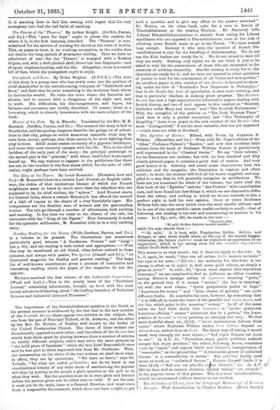The Epistles of Horace. Edited, with Notes, by Augustus S.
Wilkins. (Macmillan and Co.)—What with Mr. Page's edition of the "Odes," Professor Palmer's "Satires," and now this excellent little volume from the hand of Professor Wilkins, Horace is particularly well represented in the "Classical Series." We say "little volume," for its dimensions are modest; but with its four hundred and fifty closely-printed pages, it contains a great deal of matter. And very good matter it is. Sobriety and sound sense characterise both the criticism and the exegesis; the illustration is copious and often novel ; in short, the student will find all his wants supplied, and sup- plied in a way that he will generally recognise as satisfactory. We have not yet examined the whole of the volume, bat have read the first book of the " Epistles " and the "Are Poetics" with considerable care, and have found but few things in which we are disposed to differ from the editor, and nothing in which we do not concede to him a perfect right to hold his own opinion. Once or twice Professor Wilkins falls into the error which even the most careful editors—and he is one of the most careful—seem unable entirely to avoid,—that of following one reading in his text and commenting on another in his notes. In 1 Ep., xvii., 489, he reads in the text :—
"Buceinit alter
' Et mihi dividuo findetur munere quacks ;* "
while his note stands thus :— "'Et mihi.' It is best, with Porphyrion, Keller, Schutz, and
Kruger, to take these words alone, as the cry of the second beggar. Otherwise, the future findetur must be explained us equivalent to an imperative, which is too strong even for the mendtei impudentia which Orelli finds here."
This seems to us very sound ; but it does not apply to the text. In x., 9, again, he reads, "Qum vos ad C83111M fertie rumore secando," but says in his note,—"Effertis ; the authority for this form is too strong to allow us to reject it, with some good editors, as simply a gloss on fertis." 1u xviii., 19, "Quern tenet argenti sitis importune famesque," we are surprised to find so judicious an editor counten- ancing Schiitz's strange notion of argentum meaning "plate," on the ground that if it means "money," the line is tautologi- cal with the next clause, "Quern paupertatis pudor et fuga." "Eagerness for money" and "false shame of poverty" are quite different faults. He concludes his note, however, by remarking that "it is difficult to resist the force of the parallel auri sacra fames, and the like, which point to the meaning "money." In 37 of the same satire we feel little doubt that honestunt in "acerb) postponet honestum officium " means "attentions due to a patron," the juxta- position of dormiet in lucem pointing so strongly that way. We feel more doubtful about xv., 12-13,—" LieVil stomachosus babena dicet eques," where Professor Wilkins makes lwva habena depend on stomachosus, rather than on dicet. The latter way of taking it would mark very strongly the next clause,—" Sed tquis frenato eat ands in ore." In A.D. 10, " Pictoribus atque poetis quidlibet andeudi semper fait segue potestas," the editor, following Acron, translates aqua by "equal," and rejects Orelli and Schiitz's interpretation of "reasonable," on the ground that " ' A reasonable power of unlimited license' is a contradiction in terms." But quidlibet hardly need • mean as much as "unlimited license." Horace himself limits it in e/
lines 12-13,—" Sed non est placidis ca collet immitia," &c. In A.P. to
326 he does well caution students a ainst taking "ore rotaodo " in the popular sense of that phrase. This is a most valuable edition, which we recommend without reserve to our readers.






































 Previous page
Previous page